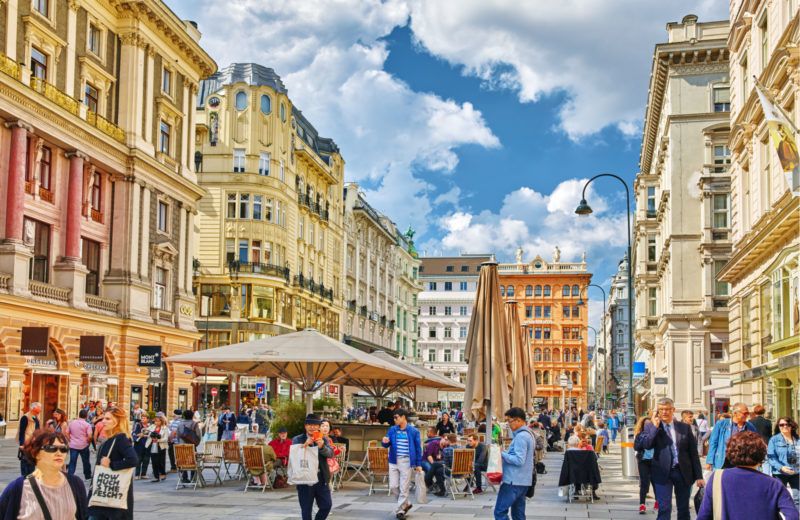An “Austrian” Agenda for Post-Coronavirus Recovery

Everyone is hoping for the light at the end of the tunnel with the coronavirus crisis. There are few who are not exhausted with fear of the illness, and with worry and despair about the economic disaster caused by the government lockdowns and stay-at-home dictates. So, eyes are turned to a post-coronavirus world and what it will be like. How will America and most of the rest of the world recover from this nature-created and man-made-exacerbated catastrophe?
U.S. state governments are tentatively promising or implementing openings of the societies over which they rule. People are being allowed to take walks in parks and do some shopping for more than politically defined “essentials.” Retail businesses and manufacturing enterprises are being permitted to open and function on limited and regulated bases. Traveling to places close to home and much more afield are slowly starting to occur for more people.
But notice the presumption is all of this, that just as the federal and state governments dictated the closing of America, those same governments must design and determine the how and the when of America being “opened” once again. That individuals could and should decide on when and how to interact with others in society, to make their own precautionary judgments concerning degrees of risk and forms of trade-offs to choose among is brushed aside under the presumption that human beings, without directing command and control from those in political power, are simply too irresponsible and unthinking.
Misguided Promise of Restored Prosperity Through Paternalism
In other words, there are all those in political authority, among declared scientific “elites,” and among the social and mass media intelligentsia who are adamant that they know what is best for others, and merely wish to protect those others from their own mindless mistakes that easily could harm themselves and those around them.
As part of this pervasive political paternalism there has been emerging discussions about how to return to full employment, restored and growing standards of living, the role of government in the post-coronavirus era in terms of more expansive and intrusive regulation and redistribution, and the general type of society that is wanted when the pandemic has come to an end or significantly subsided.
The New York Times recently made its case for a comprehensive transformation of society in a far more “progressive” and “politically correct” planned direction. Everything from the wages we earn, the everyday ways we live, and the “raised consciousness” with which we should think and act would be made over so we could all live in a better, more government-guided world. (See my article, “Will There Be Tyranny in the Post-Coronavirus World?”.)
For instance, John Cassidy, writing in The New Yorker (May 1, 2020), asks, “Will the Coronavirus Create a More Progressive Society or a More Dystopian One?” In his view, “Every day of the unfolding crisis is an argument for universal health care, competent government, and better treatment for members of the working class.” We need a recommitment to the wise welfare statist policies of the past: “A commitment to full employment, more government spending on social programs, the strengthening of labor unions, restrictions on the financial sector, and higher tax rates, especially at the top.”
Mr. Cassidy goes on to say that “If we want to create a fairer economy coming out of the pandemic, we need a . . . wave of mobilization and political boldness” to bring it about. Otherwise, America could face the type of “right-wing” populist authoritarianism recently seen in Hungary and Turkey. That is, opponents of “progressivism,” like the recent demonstrators in Michigan who are calling for the end to that state’s draconian lockdown, are precursors to “anti-democratic” forces threatening to bring about the rise of an American “autocracy” wanting to benefit the wealthy few at the expense of the working many.
Coronavirus is Not a “War” But a Disease Needing a Cure
Across the political spectrum there has been the frequent comparison to “war” in fighting and defeating the coronavirus. It is that very war analogy that implicitly helps to rationalize the imposition of the command and control response by governments, including in the U.S. Some commentators have declared that this virus is the greatest threat facing humanity since the destructive scourge of the Second World War, with its fight and final victory over Nazism.
Others have suggested that the analogy with World War II is a misplaced one. It is not a fight between conscious ideological forces wishing to slaughter and enslave tens of millions of people versus those resisting with arms to save civilization from a modern barbarism. It is, instead, a mindless microscopic organism that attaches itself to human hosts and proceeds to undermine the natural defense mechanisms in the human beings to which the virus has attached itself.
An invasion by Martians who precede to mass murder and subdue all humans on Planet Earth is a war. A giant asteroid smashing into the planet and sending deadly particles into the atmosphere is a natural disaster. The present coronavirus crisis requires each of us to follow certain social interactive precautions to minimize absorbing the virus and then to obtain medical treatments of various sorts depending upon the severity with which a person may have been infected by it.
There should be no downplaying of the seriousness of the virus and its particular deadly potential for older people with a variety of preconditions, and for reasons not yet fully determined, its apparent greater impact on certain racial and ethnic groups. For those in these demographic categories, increased caution and care needs to be taken, on the basis of the existing medical evidence. But the symptoms and the seriousness of its effect on particular individuals is neither rigidly predictable nor uniformly treatable. There is, clearly, a lot that is not known about the virus at this time.
The Pre-Coronavirus “Good Times” Hid Serious Problems
But none of this answers the question of what will need to be done to restore the economy to pre-coronavirus levels of output, and relevant relative patterns of production and employment. It tells us nothing about what should be the size and scope of government, or how best to tackle social problems about which people may have reasonable concerns.
America entered the coronavirus crisis at an apparent period of economic “good times.” Unemployment was at historic lows, the economy was growing at moderately good growth rates, real incomes across income groups were improving, and technological advances were offering newer, better, and often less expensive desired goods and services.
But beneath the positive economic terrain, government spending and borrowing continued to increase every year. The annual budget deficits had ballooned the federal government’s debt from around $5 trillion in 2000 to over $23 trillion twenty years later in early 2020. Entitlement expenditures on Social Security and Medicare, Medicaid and other health-related programs was consuming about 50 percent of everything the federal government was spending.
The federal trustees who manage the Social Security and Medicare trust funds were projecting unfunded liabilities for these programs over the remainder of this century to be in the tens of trillions of dollars in excess of what was forecast to be collected from the taxes of working age people to cover these costs under current legislation. At the same time, the currently low interest rates were (and are) hiding from view the huge expense that will have to be borne by taxpayers to fund the national debt in future years once market interest rates return at some point to more historically normal levels.
Conservatives and Republicans had long ago given up any intent or willingness, other than in some of their traditional campaign rhetoric, to cut down government spending to any more manageable size, let alone propose any reductions or repeals in government activities and redistributions. They gave up that fight long ago to try to stay in power by simply being Democrats “light.”
The “progressives” and the out-of-the-closet “democratic” socialists in or affiliated with the Democratic Party have been salivating with anticipation to regain the White House and the Senate in 2020, while retaining control of the House of Representatives, to finally and more fully implement their dreams of national and global central planning for fighting global warming and climate change in general. With no consideration of costs or where the money and resources would come from – other than from “the rich” – they wanted an explosion of domestic government spending on every dreamed of item in the grab bag of welfare statism.
The Coronavirus has Highlighted America’s Fiscal Crisis
And then came the coronavirus crisis. The government lockdowns across the country have resulted, in a matter of a few weeks, in over 30 million unemployed. Thousands of businesses have had to shut down production or close or radically reduce or change their retail activities. Incomes for families across the nation have fallen or disappeared altogether. Some of the small retail businesses may never come back or only through a hard and financially difficult process.
In January 2020, the federal government was projected to end its current fiscal year in September with a budget deficit of over $1 trillion. Now with all the “emergency” spending legislation coming out of Washington, D.C., that budget deficit is going to be at least much closer to $4 trillion for the year. State governments, most of whom have constitutional balanced budget requirements, will face dire funding problems, given the fall in state income and business taxes and the mounting costs for unemployment insurance payments and other welfare programs.
So, what is to be done to restore the vibrancy, production, and longer-term growth of the U.S. economy? Since so many, as I pointed out, use the analogy of the coronavirus crisis as a “war” for the health of mankind, similar to the Second World War as a battle to save humanity from Nazi tyranny, let us turn, therefore, to one prominent voice from that earlier time who proposed a classical liberal agenda for the post-World War II period.
America’s Problem is the Interventionist-Welfare State
The voice is that of the Austrian economist, Ludwig von Mises (1881-1973), who came to the United States from war-torn Europe in the summer of 1940, and during the remainder of the war years delivered a series of lectures and wrote a number of monographs on a classical liberal “plan” for postwar reconstruction and recovery. Many of his writings on this theme may be found in the Selected Writings of Ludwig von Mises, volume 3 (Liberty Fund, 2000), which is devoted to the problems of, “The Political Economy of International Reform and Reconstruction”.
First, Mises explained the economic policy environment before and during the war that had created the circumstances then facing the world:
“For two generations now [government] policy . . . has been based on nothing else than preventing and eliminating the function of the market as the regulator of production. By duties and trade-policy measures of other sorts, by legal requirements and prohibitions, by the subsidization of uncompetitive enterprises, by the suppression or throttling of business that offers unwelcomed competition to the spoiled children of the political regime through the regulation of prices, interest rates and wages, the attempt is made to force production into paths which it otherwise would not have taken . . .
“The result of these policies is the severe economic crisis under which we suffer today. The crisis had its starting point in mistaken economic policy, and it will not end until it is recognized that the task of governments is to create the necessary preconditions for the prosperous operation of the economy, and not squandering more on foolish expenditures than the industry of the population is able to provide.”
In Mises’ description, we find all the elements of what plagues too much of the world today, including the United States. The politicizing of market decisions and outcomes with government support for those financial institutions and corporate enterprises defined as “good big to fail.” The pervasiveness of “crony capitalism,” with “connections” and government-business partnerships that serve the political class and anti-market business groups at the expense of consumers and those who wish to freely compete on a more open market. And the use of taxpayers’ dollars to feed the network of those receiving the favors, privileges, protections, and subsidies that government has the power to hand out in various and sundry ways.
To reverse this in the postwar period, Mises argued that it was necessary to bring about a reawakened understanding of the principles of free market capitalism and classical liberalism. What needed to be implemented were economic policies consistent with those principles to create the institutional foundation for free men to interact for mutual benefit and material improvement.
The Needed Policy Shift to Long-Run Instead of Short-Run Thinking
The most fundamental changes to reestablish the foundations for a political and economic recovery, Mises said, involved the mentality of the people. The first of these changes in thinking, he argued, required no longer focusing primarily upon the short-run gains from various economic policies. “Of course, there are pseudo-economists preaching the gospel of short-run policies,” Mises admitted. “‘In the long-run we are all dead,’ says Lord Keynes. But it all depends upon how long the short run will last.” And in Mises’ view, many countries had “entered the stage in which it is experiencing the long-run consequences of its short-run policies.”
Practical politics had been geared to providing immediate benefits to various groups that could be satisfied only by undermining the long-run prospects and prosperity of society. Countries needed to design economic policies with a long-run perspective in mind. Recovery would require capital, that would only come forward if people who could save to supply the necessary investment funds had the surety that there would be a protected and respected system of property rights, strict enforcement of market contracts for domestic and foreign business, low and predictable taxes, reduced and limited government expenditures, balanced budgets, and a non-inflationary monetary environment.
These were the institutional preconditions for the economic recovery in the postwar world, Mises argued. Once these general changes had been made, governments would have done all in their power to establish the general political environment that would be most conducive to fostering the incentives and opportunities for people to start the recovery and rebirth of their countries’ economies.
A Guilt-Free and Unpunished Entrepreneurial Spirit
For this to occur, however, it was necessary to appreciate and set free those who are market-based guiders and coordinators of supplies to satisfy market demands: the entrepreneurs. However, they were among the ones who were most despised and plundered by governments in that interwar epoch of interventionism and economic nationalism before the Second World War and many of whom had been killed by the Nazis during the war.
There needed to be a new respect and regard for these creative men of the market in order to foster the emergence of a new generation of such individuals. “If there is any hope for a new upswing it rests with the initiative of individuals,” Mises said. “The entrepreneurs will have to rebuild what the governments and the politicians have destroyed.”
The Need to End Special Interest Politics and Privileges
The second change needed in the people’s mentality, Mises said, was an end to special interest group politics. Governments throughout the interwar period had followed a “producer policy,” in which individual manufacturers, farmers, and workers in various niches in the system of division of labor formed coalitions to gain favors for themselves at the expense of others in the society.
Governments had intervened, supported, and subsidized policies that in the longer run resulted in restrictions in output, misdirection of capital, and restraints on labor markets. Such policies had to be abandoned because they work counter to the integrative role prices and competition were meant to play in assuring coordination of markets, and the incentives and ability for capital formation.
Producer-oriented policies were better called “production-curtailing policies,” Mises said, since they serve to protect the less competent producers from the rivalry of the more competent. Recovering economies could ill afford to indulge in favors for the less efficient and less productive if the ravages of a war were to be overcome quickly.
Prosperity Requires Secured Freedom to Work, Save, and Invest
Third, countries needed to give up the redistributive welfare state. Mises stated emphatically that, it is the duty of honest economists to repeat again and again that, after the destruction and the waste of a period of war, nothing else can lead society back to prosperity than the old recipe – produce more and consume less.
Who would be left to be taxed in any “tax the rich and subsidize the poor” scheme in a setting in which a war has made practically everyone a “have-not,” when the focus of economic policy should be to foster capital formation, not wealth redistribution? “There is no other recipe than this,” Mises declared. “Produce more and better, and save more and more.”
Unless these changes occurred in people’s thinking, the path to economic recovery would be more difficult and protracted than it needed to be. Neither a war nor its destruction stood by themselves in the way of a better future. Ideas would determine what lay ahead. “What ranks above all else for economic and political reconstruction is a radical change of ideologies,” Mises said. “Economic prosperity is not so much a material problem; it is, first of all, an intellectual, spiritual and moral problem.”
The “Austrian” Policy Agenda is for Free Market Liberalism
For many today, such a liberal market-based plan for economic recovery after the coronavirus likely will seem to be no plan at all, since “planning” is presumed to only and always mean government-guided and commanded direction in society. But as Mises emphasized on a different occasion, classical liberalism does have a plan and a very proactive one. As he said in Planned Chaos (1947): “The liberal age [in the 19th century] certainly had a definite plan. Its plan was private ownership of the means of production, free initiative and market economy.” And those countries that adopted it in the past “were prosperous indeed under this plan.” This was the policy agenda Ludwig von Mises proposed for the postwar period after World War II.
The intellectual, spiritual and moral problems that we face only have their solution in a restoration of a political philosophy of individualism and the economic policies of free market, liberal capitalism.
Mises’s policy agenda may seem unrealistic, given the current political and economic policy environment. He was not naïve about such things. During an earlier crisis that his native Austria faced in the wake of the First World War, when his country was territorially split apart, when a new democratic socialist government was ballooning social welfare programs in every direction and paying for it with an avalanche of paper money, Mises reminded his countrymen that the problem was not the “objective” conditions that Austria found itself in that were leading to potential calamity. The country had a skilled workforce, manufacturing capabilities, and potential trading partners for both needed imports and attractive exports to pay for them.
The problem, he said, were the “subjective ones: “Our fellow citizens have not grasped the realities of the moment and instead they chase after illusionary ideas. But eventually reasonableness must prevail.”
America Restored Means Returning to Its Roots in Liberty
America is not a defeated nation. It is a vast powerhouse of productive capacity, with a huge labor force, a still very dynamic and innovative entrepreneurial spirit; and among many of the people the cultural legacy and social psychology that if a person works hard and has earned his income honestly, he should not be condemned or punished for his success.
But for decades the ideas of freedom and free enterprise based on the foundations of individual rights and competitive capitalism have been eaten away in both theory and practice. The new wave of “progressivism” and “democratic” socialism among American intellectuals, academics, and media pundits, with their rhetorical euphoria that their time is just around the corner is an indication of their confidence and zealotry.
But the policy agenda that Ludwig von Mises proposed for unleashing the possibilities and potentials of free men in an open, competitive market arena remain as vital and true as when he proposed it in the context of a recovery from a real war in the past.
The “enemy” in our case is not a “them,” but the “us.” Only by facing, challenging, and defeating the ideas of collectivism, welfare statism, and the political paternalism of governmental planning with which too many Americans have become intellectually and culturally “infected,” is there a way back to the prosperity that we can have.
The collectivism virus need not destroy us, if we immunize ourselves with the philosophy of liberty and market liberalism. What we need is herd immunity, but that requires as many of us as possible to spread the ideas of freedom to as many of our fellow citizens as is possible.











